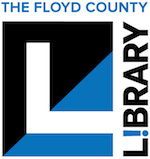November is both Native American Heritage Month and the United States’ national day of Thanksgiving – simultaneous observances somewhat at odds. Throughout history, many periods of thanksgiving were called for year round, here and around the world. In 1863, President Lincoln finally proclaimed an annual observance to heal the nation after the Civil War. Lincoln’s proclamation followed the 19th-century invention of the Thanksgiving origin story. For the Plymouth settlement’s bicentennial, descendants of the Mayflower’s survivors named their ancestors Pilgrims and created the colonial narrative of the friendly Thanksgiving feast as we know it today. It is a fictitious tale, and for many of today’s Wampanoag tribal members especially, it is a painful observance. Thanksgiving to some marks the beginning of Native American genocide across the American continent and is instead observed as a day of mourning.
Like other traditions, American Thanksgiving continues to change over time, and that’s worth many thanks. Previous generations of children learned the Thanksgiving story as fact, and celebrated by turning brown paper grocery bags into fringed vests with matching feathered headbands – a regrettable Thanksgiving tradition of my own childhood. Today’s children are more likely to list the things they are thankful for with particular emphasis on Turkey Tom in either full-health or cartooned iterations.
Amending the Thanksgiving origin story doesn’t require us to give up our personal Thanksgiving traditions, but the accuracy of the stories we believe and tell about its beginning are important. I am thankful that libraries and the communities they serve have more access to authentic Indigenous voices and experiences through literature than ever before. We can get the story straight for today’s nearly 7 million Native Americans (of 574 recognized Tribal Nations) and for the estimated 10 million American descendants of the Mayflower’s original survivors (35 million worldwide), with a visit to the Library.
The following books are available in our library for discovering or relearning the Thanksgiving story, or for reflection on our individual places in history during our holiday preparations:
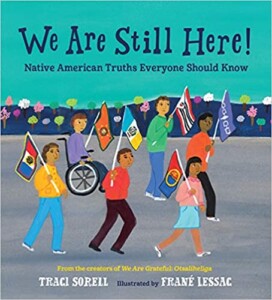 We Are Still Here! Native American Truths Everyone Should Know
We Are Still Here! Native American Truths Everyone Should Know
by Traci Sorell
Follow 12 Native American kids in this nonfiction picture book as they share truths about today’s Native American life, facing challenges, fighting for rights, and persevering. “Highlighting the fact that contemporary Native American life is ongoing, this indispensable picture book presents truths about Native Americans that everyone should know.”
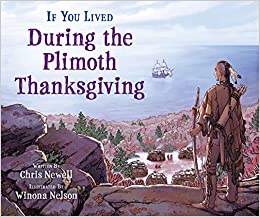
If You Lived During the Plimoth Thanksgiving
by Chris Newell
Alexander Young was a Boston writer, who in 1841 published a book that contained a single letter sent to England that included a short description of a feast in 1621. It was Young who named the feast “the first thanksgiving.” Young assumed the meal resembled his 19th-century traditions. It was a huge mistake. What was published as a mere footnote sparked the creation of the Thanksgiving origin story we know today. Learn more essential history from Newell in this Scholastic Press publication.
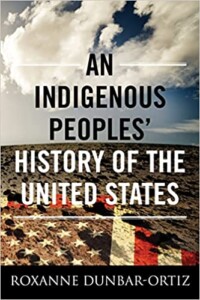
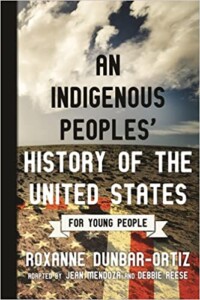
An Indigenous Peoples’ History of the United States, &
An Indigenous Peoples’ History of the United States for Young People
by Roxanne Dunbar-Ortiz
Called “the most important US history book you will read in your lifetime” by historian Rob D. G. Kelley, this book challenges the discovery of the New World and explores the role of colonialism in the formation of the United States. Both the adult and youth versions include archival images, original maps, topics for discussion, reading recommendations, and more for readers of all ages “to think critically about their own place in history.”
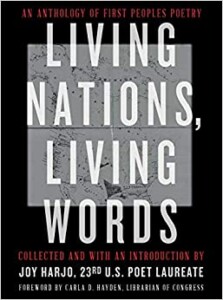 Living Nation, Living Words: An Anthology of First Peoples Poetry
Living Nation, Living Words: An Anthology of First Peoples Poetry
edited by Joy Harjo, 23rd U.S. Poet Laureate
This Native American poetry collection published by the Library of Congress (2021) “reflect[s] on the theme of place and displacement and circle the touchpoints of visibility, persistence, resistance, and acknowledgement.” Harjo’s laureate project has been to map the poets of Native Nations, “celebrating their unequivocal contributions to American poetry.” The entire Living Nations, Living Words map can be found at LOC.gov.
Happy Thanksgiving to all. May your celebrations be happy, healthy, and full of thanks!
